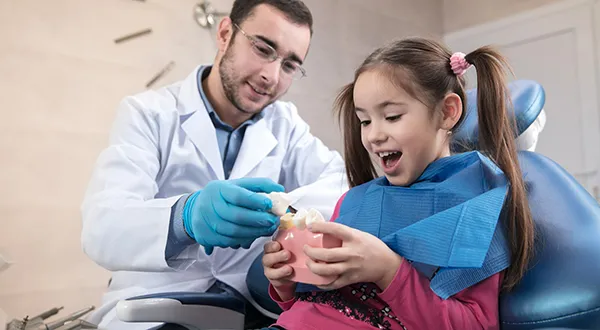Taking your child to the dentist can be daunting. But it doesn’t have to be. When you choose a dentist in Pleasanton, CA, you’re not just looking for care. You’re looking for a partner who understands children and makes them feel safe. Children are sensitive. A gentle touch and kind words can make a big difference. Establish a positive relationship early on. This helps your child feel less fear. It also encourages good dental habits for life. Routine visits should be fun, not a chore. Tell stories, play games, or bring a favorite toy to ease nerves. You can create a reassuring environment. Together, parents and dentists can help children develop a love for taking care of their teeth. Start today. Offer understanding and support. Let children know that visiting the dentist is a step towards a happy, healthy smile. It’s about making memories, not just appointments.
The Importance of Early Dental Care
Early dental care is crucial. The American Academy of Pediatric Dentistry recommends children see a dentist by their first birthday. Early visits build trust and set the stage for lifelong healthy habits. They help catch problems early. This prevents future issues. According to the Centers for Disease Control and Prevention, untreated cavities can cause pain and infections. They can lead to issues with speaking, eating, and learning.
Creating a Child-Friendly Environment
Creating a welcoming environment is key. This can start at home. Use storybooks and videos about dentists. Explain what happens during a visit. Encourage questions. Let children express their feelings. You can role-play as a dentist and patient. This familiarizes them with the process. At the clinic, look for child-friendly touches. Waiting rooms with toys and books make visits enjoyable. Staff who greet warmly help children feel at ease.
Engaging with the Dentist
During the appointment, interaction matters. A dentist who explains each step demystifies the process. They should use simple words. Children need to know what to expect. Praise is powerful. Recognizing bravery encourages children and lowers anxiety. Parents should stay calm. Children take cues from adults. If parents show confidence, children will follow.
Effective Communication Techniques
Communication is the foundation. Clear explanations can turn fear into curiosity. Avoid saying things like “It won’t hurt.” Instead, focus on positive statements. For example, “The dentist is checking your smile.” This reframes the visit as a positive experience. Encourage children to ask questions. They should feel involved.
Comparison: Positive vs. Negative Dental Experiences
| Aspect | Positive Experience | Negative Experience |
|---|---|---|
| Environment | Welcoming with toys and friendly staff | Cold and clinical atmosphere |
| Communication | Clear and reassuring explanations | Vague or frightening descriptions |
| Parental Role | Supportive and calm presence | Nervous or dismissive attitude |
Maintaining Good Oral Habits at Home
Home habits reinforce positive experiences. Make brushing and flossing part of the daily routine. Let children pick out their toothbrush. This gives them control. Use a timer or a fun song to make brushing enjoyable. Consider rewards for consistent habits. Regular home care leads to less stress during dental visits.
Conclusion: Building Positive Memories
In conclusion, a positive dental experience for young children starts with understanding and preparation. A dentist in Pleasanton, CA, can be a partner in this journey. By creating a warm environment, using effective communication, and fostering good habits, you can help your child view dental visits as a positive part of life. Remember, it’s about building memories and fostering lifelong health. Start early. Stay involved. Your child’s smile is worth it.
